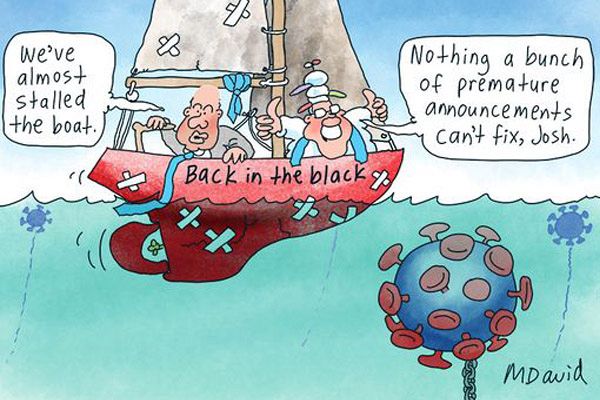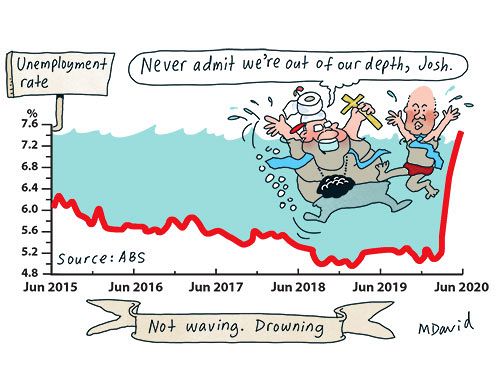Prominent Australians, including the Treasurer, are urging corporate tax cuts. A smart move, or not? Alan Austin evaluates the evidence.
LATVIA, a small former Soviet state on the Baltic Sea, disturbed some economists when its jobless rate improved from 8.5% to 7.0% in 2018. It then fell to 6.0% in 2019. This was not supposed to happen.
Over the same period, wages grew from around €670 (AU$1088.70) per month to well above €800 (AU$1299.94). Productivity improved from 105.4 to 114.1 index points. Homeownership increased steadily. How can this be?
Latvia’s retail trade grew impressively throughout 2018 and 2019, with only one negative month out of 24. What has gone so horribly wrong?
Monthly exports boomed through 2018, reaching new all-time highs five times. Export growth was among the highest in advanced economies (see graph 1 below). The Federal Budget moved ever closer to surplus. Debt to GDP declined steadily. This is appalling.

The so-called experts who would have been perturbed at Latvia’s surging economy are those urging governments to cut corporate taxes. Their advice is that cutting them is good for the economy and raising them is bad. Really?
In 2018, Latvia increased its company tax rate from 15% where it had been for the previous 16 years way up to 20%. Its economy then boomed.
Latvia is not alone. Germany, South Korea, Turkey, Ecuador, Taiwan and Slovenia have all lifted the corporate taxes in recent years — and reaped the benefits.
Taiwan’s similar surge
Taiwan increased its corporate tax rate in 2017 from 17% to 20%. Outcomes were almost as impressive as Latvia’s.
The jobless rate dropped to 3.72% by the end of 2019. Wages grew steadily over that period. Productivity reached a new all-time high of 119.5 index points in January this year. Household disposable income rose by 2.7% in 2019, higher than inflation which was below 1.0% for most of 2019.
Taiwan’s housing index – which measures the overall value of housing – increased steadily, as did manufacturing and industrial production. Retail trade expanded, with only one negative month in 2019. The Federal Budget deficit has decreased for each of the last three years, moving ever closer to surplus. Pretty good.
Now let’s look at economies which followed the advice to reduce corporate taxes.
USA — the current global basket case
The classic case is the United States, which slashed the rate from 35% down to 21% in late 2017. This was the most dramatic tax cut in recent world history and may be recorded as the most disastrous.
The consequences were swift and terrible. The budget deficit in 2016-17 had been a modest US$666 billion (AU$928.6 billion). This sounds a lot – okay, yes, it is a lot – but was only 3.5% of gross domestic product (GDP). Government revenue that year was 83.3% of spending. Federal debt at the end of the financial year, 30 September 2017, was $20.2 trillion (AU$28.2 trillion).
Just two years later, by September 2019, the deficit had blown out to $984 trillion (AU$1.37 quadrillion), at 4.6% of GDP. Revenue fell to 77.9% of spending and the debt ballooned to $22.7 trillion (AU$31.7 trillion). This was despite President Donald Trump’s promise that he would generate surpluses and pay back all U.S. federal debt.
Over this period, the jobless rate remained low, but virtually all other indicators deteriorated. Real wages fell, labour underutilisation surged, the housing index declined and homeless numbers increased greatly. Manufacturing activity fell away and overall exports tumbled badly (see graph 1 above). The trade deficit deepened to more than $50 billion (AU$69.7 billion) for nine months in 2019 and the stock market whipsawed alarmingly.
Economic growth collapsed from ranking tenth or higher among OECD countries in 2018 to 18th by mid-2019. GDP per person fell in real terms after inflation, which exceeded 2.5% several times in 2018 and 2019. GDP growth from 2016 to 2019 ranked a miserable 14th among the world’s 20 largest economies (see graph 2 below).

It is critical to note that all these outcomes were recorded before COVID-19 was even heard of. Things are vastly worse now.
Other economies to slash the corporate tax rate with damaging consequences include Spain, Italy, Israel, India and Sweden.
Italy reduced its corporate rate from 31.4% in 2016 to 24.0% where it has stayed since. Italy’s jobless rate remains among the developed world’s highest, declining from 11.5% at the start of 2016 to 9.5% at the end of 2019. Household debt to GDP reached an all-time high in 2019. Federal debt at the end of 2019 was just as deep as in 2016, at a thumping 134.8% of GDP. Again, these outcomes are pre-COVID-19.
Calls for tax cuts from the rich
Those pushing this discredited policy include executives of the big foreign corporations currently shunting billions of dollars of Australia’s wealth out of the country, Business Council of Australia chief Jennifer Westacott and, sadly, Treasurer Josh Frydenberg.
Their claim that lower corporate taxes will boost the economy is not validated. It has been exposed many times to be a zombie belief.
‘...a belief that has repeatedly been proved false, but refuses to die; instead, it just keeps shambling along, eating people’s brains.’
In reality, what these groups want is more of the nation’s wealth for offshore investors and less for the people of Australia.
Getting the balance right
So what is the optimum company tax level? How can we tell? Several ways. We can observe those governments with well-managed economies and successful social programs. These include Malta (35%), France (33.3%), Japan (30.6%), Germany (30%), Belgium (29%) and New Zealand (28%).
We can also track changes following decisions to raise or lower the corporate tax rate, as this analysis has done partially.
The best rate will not be the same everywhere. On the evidence, between 28% and 34% seems optimum for major developed nations like Australia, France and the USA. Lower rates suit emerging economies such as Latvia, Thailand and Malaysia. But as they advance, higher rates will serve better.
For Australia, the answer is easy. During the last global economic crisis, the Rudd Government maintained the corporate tax rate at 30%, despite strident demands to reduce it. The result was the world’s best-performed economy from 2009 to 2013. Tax evasion over the last six years has effectively reduced this substantially. So when the Government – the current one or the next – fixes this, the economy should recover some of the losses suffered since 2013.
Alan Austin’s defamation matter is nearly over. You can read an update HERE and help out by contributing to the crowd-funding campaign HERE. Alan Austin is an Independent Australia columnist and freelance journalist. You can follow him on Twitter @AlanAustin001.
Related Articles
- Australia’s 'Titanic' economy is sinking
- Poor decisions are wrecking Australia’s economy, not the virus
- Wren's Week: Liberal Party has no chance of leading us out of a recession
- Coalition trebles Labor’s debt – in triple-quick time
- Morrison Government forges ahead with penalty rate cuts
 This work is licensed under a Creative Commons Attribution-NonCommercial-NoDerivs 3.0 Australia License
This work is licensed under a Creative Commons Attribution-NonCommercial-NoDerivs 3.0 Australia License
Support independent journalism Subscribe to IA.














